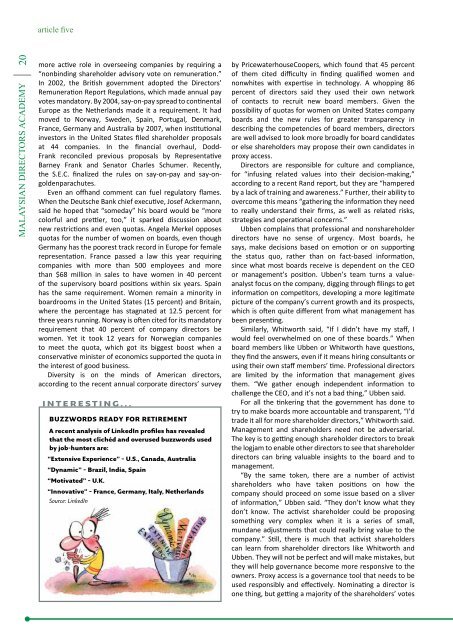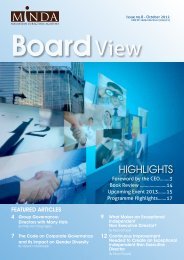September 2011 - MINDA Malaysian Directors Academy ...
September 2011 - MINDA Malaysian Directors Academy ...
September 2011 - MINDA Malaysian Directors Academy ...
Create successful ePaper yourself
Turn your PDF publications into a flip-book with our unique Google optimized e-Paper software.
article fiveMALAYSIAN DIRECTORS ACADEMY 2026Qmore active role in overseeing companies by requiring a“nonbinding shareholder advisory vote on remuneration.”In 2002, the British government adopted the <strong>Directors</strong>’Remuneration Report Regulations, which made annual payvotes mandatory. By 2004, say-on-pay spread to continentaldirectly with shareholders. Since the board is responsible forEurope as the Netherlands made it a requirement. It haddetermining the nature and extent of the significant risks themoved to Norway, Sweden, Spain, Portugal, Denmark,France,companyGermanyis willingandto take,Australiait’s notbyunusual2007, whenfor theinstitutionalchairmaninvestors explain in the the company’s United States business filed model shareholder as well as proposalsthe formal44 performance companies. evaluation In the of the financial board as overhaul, a whole.” Dodd-atFrank It might reconciled be well previous for directors proposals to consider by that RepresentativegovernanceBarney concepts Frank originating and outside Senator the Charles United States Schumer. have Recently,a historythe of moving S.E.C. into finalized the American the rules mainstream on say-on-pay rather quickly. and say-ongoldenparachutessider“shareholder say on pay,” which grew out of a 1999Con-white Even paper an offhand by the British comment cabinet can minister fuel regulatory Stephen Byers flames.When suggesting the Deutsche that shareholders Bank chief have executive, a more active Josef role Ackermann, in overseeinghe companies hoped that by “someday” requiring a his “nonbinding board would shareholder be “moresaidcolorful advisory vote and on prettier, remuneration.” too,” it In sparked 2002, the discussion British gov- aboutnew ernment restrictions adopted and the <strong>Directors</strong>’ even quotas. Remuneration Angela Merkel Report opposes Regulations,for which the made number annual of women pay votes on mandatory. boards, even By 2004, thoughquotasGermanysay-on-payhasspreadthe poorestto continentaltrack recordEuropeinasEuropethe Netherlandsfor femalerepresentation. France passed a law this year requiringmade it a requirement. It had moved to Norway, Sweden,companies with more than 500 employees and moreSpain, Portugal, Denmark, France, Germany and Australia bythan $68 million in sales to have women in 40 percent2007, when institutional investors in the United States filedof the supervisory board positions within six years. Spainshareholder proposals at 44 companies. In the financial overhaul,Dodd-Frankhas the same requirement. Women remain a minority inboardrooms in thereconciledUnited Statesprevious(15proposalspercent)byandRepresentativeBarney the percentage Frank and Senator has stagnated Charles Schumer. at 12.5 percent Recently, forBritain,wherethree the S.E.C. years finalized running. the Norway rules on is say-on-pay often cited and for say-on-goldenparachutes.that 40 percent of company directors beits mandatoryrequirementwomen. Even Yet an offhand it took comment 12 years can for fuel Norwegian regulatory companiesflames.to When meet the the Deutsche quota, Bank which chief got executive, its biggest Josef boost Ackermann, when aconservative said he hoped minister that “someday” of economics his board supported would be the “more quota colorfuland interest prettier, of good too,” it business. sparked discussion about new restric-inthetions Diversity and even is quotas. on the Angela minds Merkel of opposes American quotas directors, for theaccording number of to women the recent on boards, annual even corporate though Germany directors’ has survey theinteresting...BUZZWORDS READY FOR RETIREMENTA recent analysis of LinkedIn profiles has revealedthat the most clichéd and overused buzzwords usedby job-hunters are:“Extensive Experience” – U.S., Canada, Australia“Dynamic” – Brazil, India, Spain“Motivated” – U.K.“Innovative” – France, Germany, Italy, NetherlandsSource: LinkedIn3 . 2 0 1 1by PricewaterhouseCoopers, which found that 45 percentof them cited difficulty in finding qualified women andnonwhites with expertise in technology. A whopping 86percent of directors said they used their own networkof contacts to recruit new board members. Given thepoorest track record in Europe for female representation.possibility of quotas for women on United States companyFrance passed a law this year requiring companies with moreboards and the new rules for greater transparency indescribingthan 500 employeesthe competenciesand moreofthanboard$68members,million indirectorssales are have well women advised in 40 to percent look more of the broadly supervisory for board board candidates positionsor within else shareholders six years. Spain may has propose the same their requirement. own candidates Women inproxy remain access. a minority in boardrooms in the United States (15percent) <strong>Directors</strong> and are Britain, responsible where the for percentage culture has and stagnated compliance, atfor 12.5 “infusing percent for related three years values running. into their Norway decision-making,”often cited foraccording its mandatory a requirement recent Rand that report, 40 percent but they of are company “hampered directorsa lack be women. of training Yet it and took awareness.” 12 years for Further, Norwegian their companies ability tobyovercome to meet the this quota, means which “gathering got its biggest the information boost when they a conservativereally minister understand of economics their firms, supported as well the as quota related in the risks,needtostrategies interest of and good operational business. concerns.”Ubben Diversity complains is on the that minds professional American and directors, nonshareholder accordingto the recentdirectors have noannualsensecorporateof urgency.directors’Mostsurveyboards,by PricewaterhouseCoopers,which found that 45 percent of themhesays, make decisions based on emotion or on supportingthe status quo, rather than on fact-based information,cited difficulty in finding qualified women and nonwhitessince what most boards receive is dependent on the CEOwith expertise in technology. A whopping 86 percent of directorssaid they used their own network of contacts to recruitor management’s position. Ubben’s team turns a valueanalystfocus on the company, digging through filings to getinformationnew board members.on competitors,Given thedevelopingpossibilityaofmorequotaslegitimateforpicture women of on the United company’s States company current growth boards and and the its new prospects, ruleswhich for greater is often transparency quite different in describing from what the competencies management of hasbeen board presenting.members, directors are well advised to look morebroadly Similarly, for board Whitworth candidates said, or “If else I shareholders didn’t have may my staff, proposetheir feel own overwhelmed candidates in on proxy one of access. these boards.” WhenIwouldboard <strong>Directors</strong> members are like responsible Ubben or for Whitworth culture and have compliance, questions, forthey “infusing find the related answers, values even into their if it means decision-making,” hiring consultants accord-orusing to their a recent own Rand staff report, members’ but they time. are Professional “hampered by directors a lackare of training limited and by awareness.” the information Further, that their management ability to overcome givesthem. this means “We“gathering enough the information independent they need information to really understandtheir CEO, firms, and as well it’s not as related a bad thing,” risks, strategies Ubben said. andtochallengeoperational For all the concerns.” tinkering that the government has done totry toUbbenmakecomplainsboards morethataccountableprofessionalandandtransparent,nonshareholder“I’dtrade it all for more shareholder directors,” Whitworth said.directors have no sense of urgency. Most boards, he says, makeManagement and shareholders need not be adversarial.decisions based on emotion or on supporting the status quo,The key is to getting enough shareholder directors to breakrather than on fact-based information, since what most boardsthe logjam to enable other directors to see that shareholderreceive is dependent on the CEO or management’s position.directors can bring valuable insights to the board and tomanagement.Ubben’s team turns a value-analyst focus on the company,digging “By the through same filings token, to get there information are a number on competitors, of activistshareholders developing a more who legitimate have taken picture positions of the company’s on how currentgrowth should and its proceed prospects, on which some issue often based quite on different a sliverthecompanyof from information,” what management Ubben has said. been “They presenting. don’t know what theydon’t Similarly, know. The Whitworth activist shareholder said, “If I didn’t could have be my proposingstaff, Isomething would feel overwhelmed very complex on when one of these it is boards.” a series When of small, boardmundane members like adjustments Ubben or that Whitworth could really have questions, bring value they to find thecompany.” the answers, Still, even there if it means is much hiring that consultants activist shareholdersor using theircan own learn staff members’ from shareholder time. Professional directors directors like Whitworth are limited andUbben. by the information They will not that be management perfect and will gives make them. mistakes, “We gather butthey enough will independent help governance information become to more challenge responsive the CEO, to and theowners. it’s not a Proxy bad thing,” access Ubben is a governance said. tool that needs to beusedForresponsiblyall the tinkeringand effectively.that the governmentNominatinghasadonedirectorto tryisone thing, but getting a majority of the shareholders’ votes(continued on page 73)T h e K o r n / f e r r y i n s T i T u T eHal Mayforth







